No one develops their worldview in a vacuum. It is a product of your interactions with everyone you read, listen and talk to. I’m certainly no exception.
I’ve benefited greatly from the ideas of other people. But often, those thinkers’ ideas aren’t neatly encapsulated in a single, easy-to-read book. Today, I’d like to share some of the people who have influenced my thinking the most.
To keep the list manageable, I’d like to focus on the people who have most greatly influenced my thoughts on learning. Perhaps I’ll write a later post for more general influences, but today, I’m sharing some of the people who have taught me the most about the subject I spend the majority of my time thinking about!
Side Note: As I was writing this, the resulting essay turned out to be quite long (4000+ words). Thus, I’m splitting it into two parts. This first part covers more of my influences from cognitive science, and the second part covers more personal ones.
1. Anders Ericsson
Anders Ericsson was a psychologist best known for his work on deliberate practice. This is the theory that world-class performance—in music, athletics, chess and many other domains—is best explained by large quantities of focused practice.
Ericsson’s research into practice began with a longitudinal study, where an individual subject repeatedly practiced a short-term memory task to remember strings of digits after hearing them only once. Famously, most people who do this test can successfully recall between five to nine digits. But, after considerable practice, this highly-trained subject could successfully recall over eighty digits. This breakthrough inspired a lifetime of work exploring how focused training and effort could lift the limits of human performance.
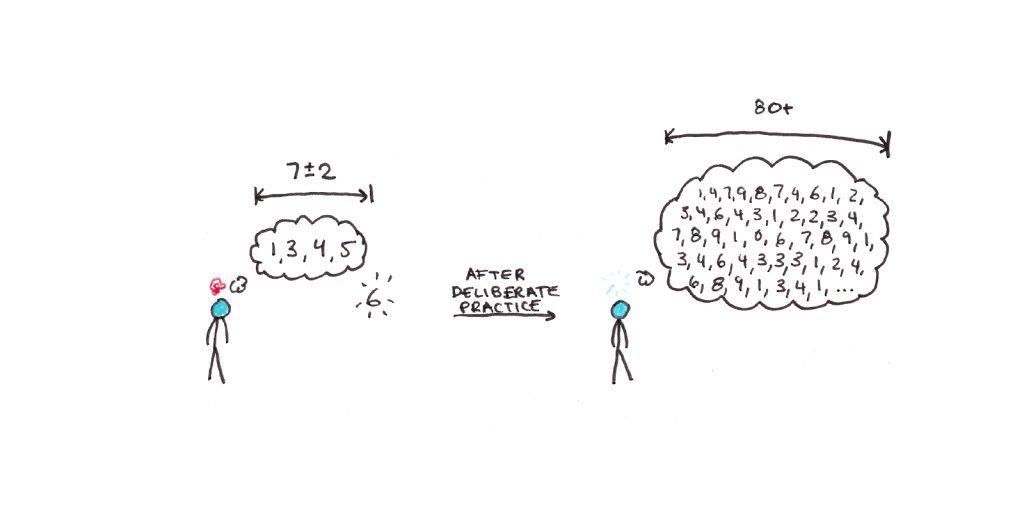
Professionally, Ericsson’s work was central in Cal Newport and my thinking when designing our course, Top Performer. His focus on the value of strenuous practice sessions has been a major factor in my own learning projects.
Personally, I think Ericsson’s work has shaped a fundamental belief of mine that practice and study can ameliorate most differences in skilled performance. While the outside world often prefers people who are effortlessly clever, I’ve come to admire more those whose abilities have emerged after painstaking work.
Here are some recommendations if you want to read more:
- Peak – Ericsson’s book, co-authored with journalist Robert Pool, aimed at a non-academic audience.
- The Role of Deliberate Practice – Ericsson’s highly-cited paper, written with Ralf Krampe and Clemens Tesch-Römer, introducing the concept of deliberate practice.
- Toward a General Theory of Expertise – Of all Ericsson’s edited volumes, I found this the most interesting in reviewing the state of theories of how expert performance works.
2. John Sweller
Some people persuade you immediately to their point of view. Others, you fight vehemently until you finally surrender to the weight of their arguments and admit they were right. For me, John Sweller was the latter.
My introduction to his work came from his studies that showed, contrary to my prior assumption, that you don’t necessarily learn more from solving a problem yourself rather than having it be taught to you directly.
Sweller formulated cognitive load theory, which I reviewed in-depth here. The gist of it is that constraints on working memory form the primary bottleneck to learning skills we haven’t evolved to acquire automatically.
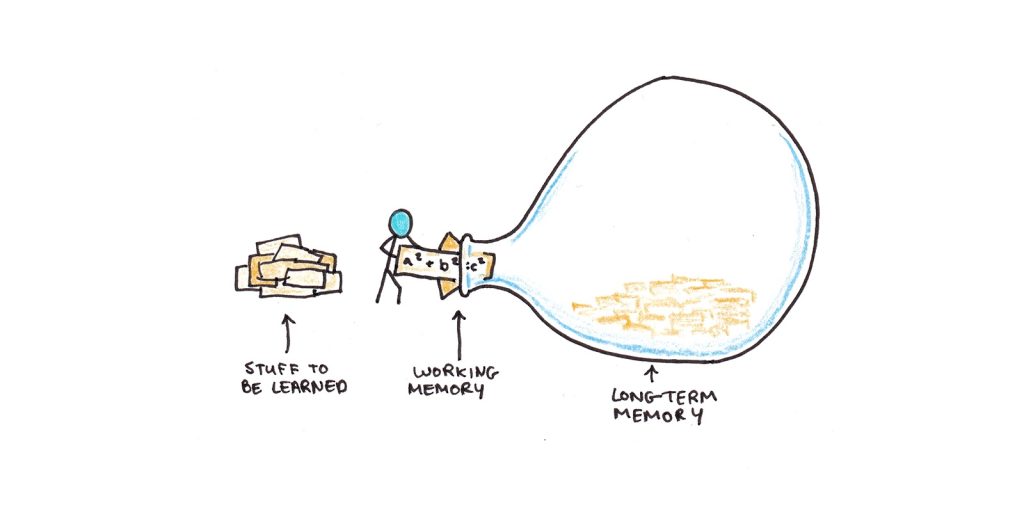
A key finding of cognitive load theory is that students with low prior experience with a skill benefit more from observing examples and explanations than from trying to figure out things on their own. This is often true, even if the student might successfully solve the problems they’re provided.
Reading Sweller, and other cognitive load theorists’ work, helped me realize that the majority of knowledge we need to perform complex skills comes from others and that barriers that make it harder to learn from others, such as poor explanations, omitted mental steps, or excessive reliance on figuring things out for yourself, are often the largest initial barrier in learning.
Here are some recommendations if you want to read more:
- Sweller’s Cognitive Load Theory in Action – Authored by Oliver Lovell, this book best explains Sweller’s work and its importance to instructors and teachers.
- Why Minimal Guidance Doesn’t Work – This paper sharply critiques the pervasive belief that students benefit when left to figure problems out independently rather than being explicitly taught.
- The Power of Explicit Teaching and Direct Instruction – Authored by Greg Ashman, one of Sweller’s students, this book is an easy-to-read summary of the evidence supporting cognitive load theory. While no one argument on its own provides a knockout of opponents, the weight of evidence across multiple fields is difficult to refute.
3. Robert Bjork
Robert Bjork is a cognitive psychologist best known for his theory of desirable difficulties.
The basic idea behind desirable difficulties is that certain interventions can make training seem less successful because students perform more poorly tests immediately after the intervention. Yet, in the long term, those interventions can create skills and memories that are more durable or widely applicable to other situations than more immediately effective ones.
Some key desirable difficulties include:
- Spacing. Spreading studying out over time reduces immediate performance, but enhances long-term memory. Cramming may have a better short-term result, but it is less efficient for learning.
- Retrieval. Recalling a memory strengthens it more than reviewing does.
- Variability. Practicing multiple examples, skills or problem-types in the same session slows learning but results in more transfer of that learning to new skills, longer retention, or both.
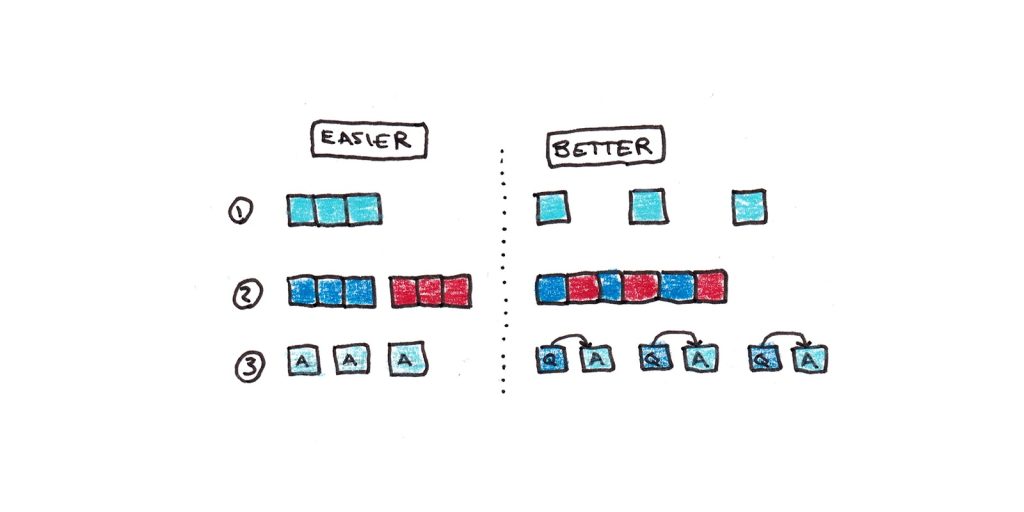
Another common finding in Bjork’s work is that students fail to appreciate the value of desirable difficulties.
Students, even those who go through the protocol and learn more under the more challenging task constraints, tend to rate the easier practice as better. I’ve argued that this illusion is a critical reason many students engage in endless review sessions rather than practice tests, which require recalling the material.
Clearly, there’s tension between desirable difficulties (which argues retrieval works better than review) and cognitive load theory (which argues examples are better than problem-solving efforts for novices). I might write a future post digging into the debates, but it seems fairly clear that both seeing examples and retrieval practice are important for learning complex skills.
Here are some recommendations if you want to read more:
- A New Theory of Disuse – Bjork’s paper, co-authored with Elizabeth Bjork, argues that our memories have both retrieval and storage strengths—implying that memories can be well-learned but temporarily inaccessible when we don’t practice them.
- Self-Regulated Learning – A good summary of desirable difficulties and our frequent failure to appreciate them in our own training.
4. Michelene Chi
Michelene Chi’s best-known work is her study of physics experts and novices. When asked to categorize problems by type, Chi found that experts could correctly sort the problems by the fundamental physics principle involved in the solution. In contrast, novices focused on superficial features of the problem, such as whether it involved a ramp or pulley.
A frustration of many teachers is that novices, even after taking multiple classes, often reason about problems in a superficial way. When we teach physics or economics, we don’t want students just to be able to handle textbook problems—we want them to apply these abstract concepts to other domains.
Still, this appears to be the natural trajectory of developing expertise. Abstract concepts, which allow you to navigate superficially different problems that have a common underlying principle, require many different examples and experiences to generalize. With only a few explanations and problem sets, most classes don’t provide an opportunity to reach this level of generalization.
Here are some recommendations if you want to read more:
- Categorization and Representation of Physics Problems by Experts and Novices – Her classic paper with Robert Glaser and Paul Feltovich.
- Eliciting Self-Explanations Improves Understanding – Exploring how student-led explanations of problems can assist in deeper understanding.
5. Herbert Simon
Herbert Simon was an impressive polymath. He helped launch the field of artificial intelligence, defined a new paradigm for the psychology of complex skills, wrote a classic book on administrative theory, and even won a Nobel prize in economics for his theory of bounded rationality.
His theory of problem-solving has influenced me the most. According to this theory, the way we solve problems is:
- We form some mental representation of the problem. This creates a problem space that has:
- Our current state.
- Some way of checking whether we’ve reached a satisfactory solution.
- Methods for changing from the current state to a new state.
- We apply those methods in a searching process, looking for a state that satisfies the solution.
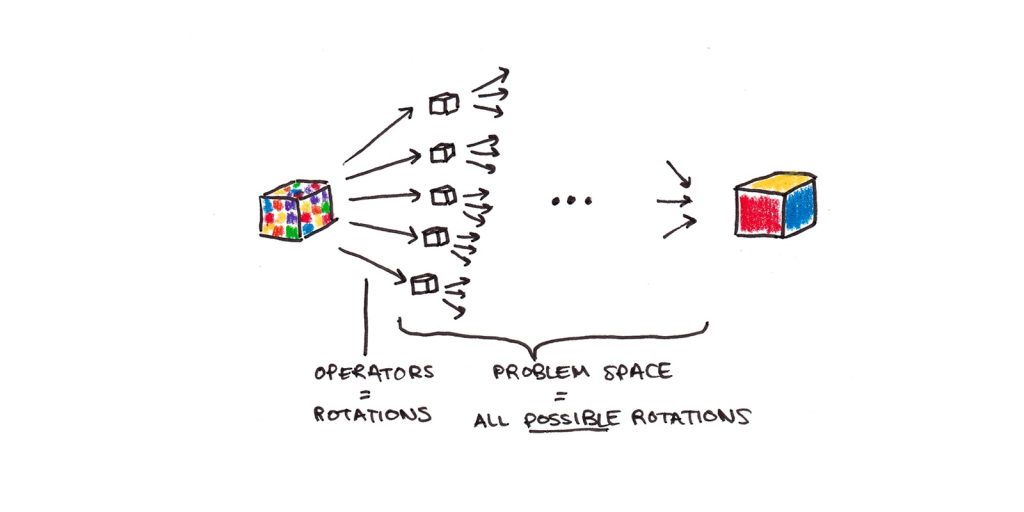
The vast majority of problems we face in life have enormous problem spaces. The principal way we deal with this difficulty is by applying strong methods, primarily learned from other people, to cut the size of the problem space down dramatically.
Here are some recommendations if you want to read more:
- Human Problem Solving – His landmark book, with Allen Newell. Read my review here.
- Perception in Chess – A classic paper authored with William Chase, arguing that chess expertise depends on accumulating perceptual “chunks.” They estimate that a chess expert may have tens of thousands of these perceptual units in memory, comparable to the number of words a fluent speaker knows in a language.
6. John Anderson
Most psychological theories are narrow in scope. A scientist devises an experimental paradigm, discovers an interesting effect, and then a flurry of research follows attempting to explain, refute or delineate its boundary conditions.
John Anderson’s career-spanning work with ACT-R is different. Instead of trying to explain a single psychological quirk, he has attempted to build a computer simulation that would model the entire mental process of skill acquisition—from how people comprehend examples and instructions to what changes in their minds as they gain more practice.
I’ve reviewed Anderson’s theory here, but the basic idea is that cognitive skills consist of two parts: declarative and procedural memory. Declarative memory is for facts and examples, and it works associatively. Procedural memory consists of production rules that trigger when certain conditions are met. Skill learning is a process of, first, acquiring declarative memories that explain and guide the skill, and then converting those to production rules that can trigger automatically.
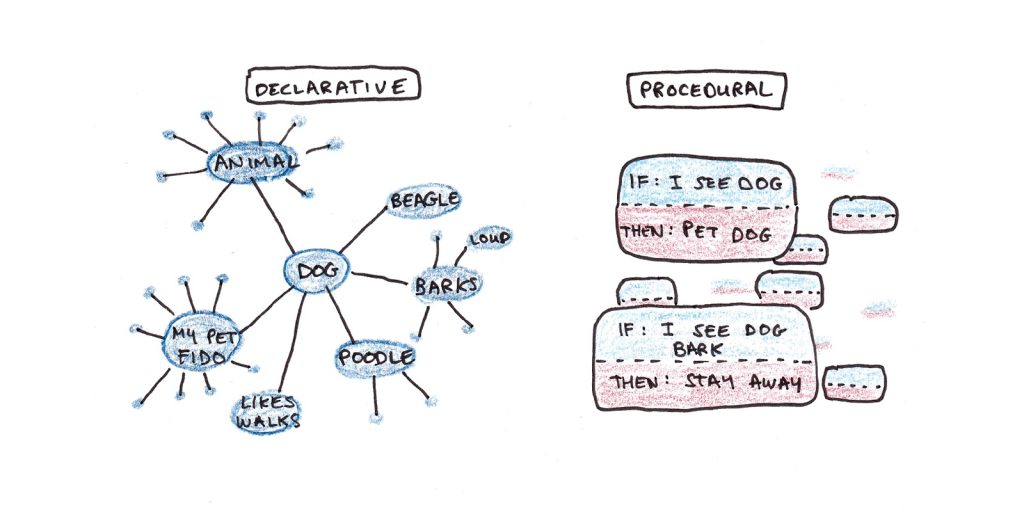
Here are some recommendations if you want to read more:
- The Transfer of Cognitive Skill – Co-written with Mark Singley, this was an early demonstration of the theory, it also has an excellent overview of the research on skill transfer— how practice in one skill influences another.
- The Atomic Components of Thought – Co-written Christian Lebiere, this is a full description of the ACT-R theory and what it implies for skill development.
- How Can the Human Mind Occur in the Physical Universe? – Anderson’s last book explains the motivation for developing a complete cognitive architecture—a complete view of how the mind works—rather than just analyzing a particular psychological phenomenon.
7. Walter Kintsch
Walter Kintsch was an expert on the psychology of reading comprehension. He developed the Construction-Integration theory of comprehension, which argued that when we read something, we:
- Form multiple, conflicting representations of the text.
- These conflicting representations inhibit each other so that only the most likely option emerges into consciousness.
- In addition to a literal understanding of the text, we form a situation model that allows us to make inferences not explicitly mentioned in the text.
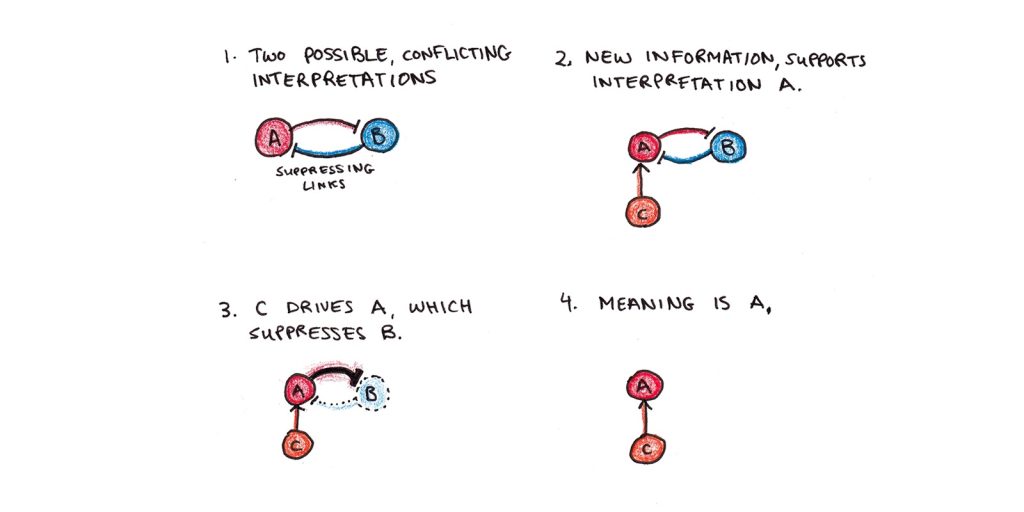
I’ve reviewed the full theory here. While Kintsch focused on reading comprehension, his theory of comprehension could also be applied to other intellectual skills and domains of expertise.
Here are some recommendations if you want to read more:
- Comprehension – Kintsch’s book outlining the Construction-Integration theory.
- Learning from texts: Effects of prior knowledge and text coherence – An interesting study showing that, for higher-knowledge students, a less well-organized text resulted in more learning than a better-organized text.
- Long-Term Working Memory – Co-authored with Anders Ericsson, another major influence of mine, this paper explains their theory of how experts can bypass the well-documented working memory limitation when performing skilled tasks.
_ _ _
That’s it for today. In the second part, I’ll round out a few more of my academic influences, popular writers, and individuals who have shaped my thinking about learning.


 I'm a Wall Street Journal bestselling author, podcast host, computer programmer and an avid reader. Since 2006, I've published weekly essays on this website to help people like you learn and think better. My work has been featured in The New York Times, BBC, TEDx, Pocket, Business Insider and more. I don't promise I have all the answers, just a place to start.
I'm a Wall Street Journal bestselling author, podcast host, computer programmer and an avid reader. Since 2006, I've published weekly essays on this website to help people like you learn and think better. My work has been featured in The New York Times, BBC, TEDx, Pocket, Business Insider and more. I don't promise I have all the answers, just a place to start.